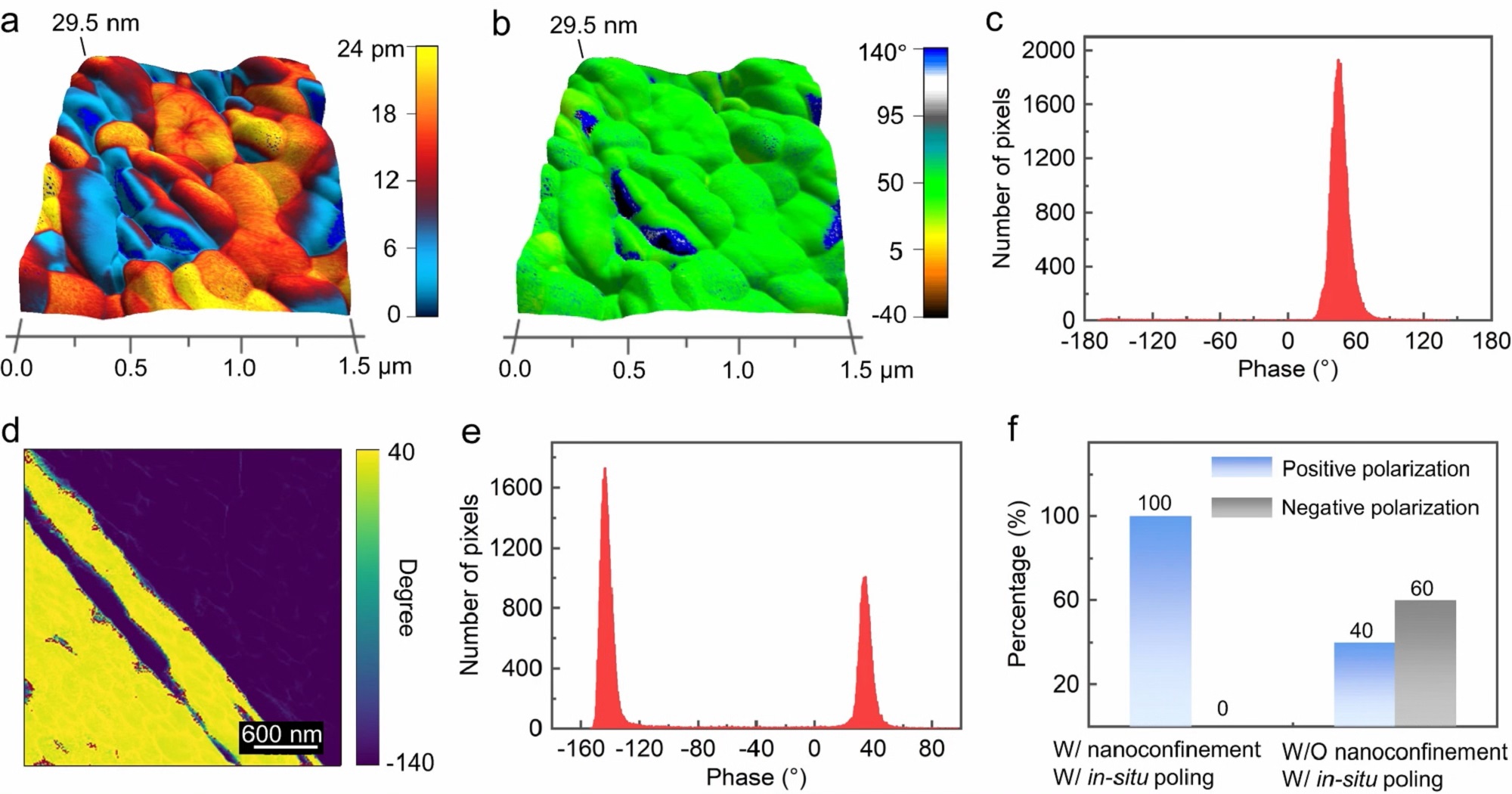Piezoelectric biomaterials have actually brought in excellent attention owing to the current acknowledgment of the effect of piezoelectricity on biological systems and their possible applications in implantable sensing units, actuators, and energy harvesters. Nevertheless, their useful usage is impeded by the weak piezoelectric result triggered by the random polarization of biomaterials and the obstacles of massive positioning of domains. *
In the short article “ Active self-assembly of piezoelectric biomolecular movies by means of synergistic nanoconfinement and in-situ poling” Zhuomin Zhang, Xuemu Li, Zehua Peng, Xiaodong Yan, Shiyuan Liu, Ying Hong, Yao Shan, Xiaote Xu, Lihan Jin, Bingren Liu, Xinyu Zhang, Yu Chai, Shujun Zhang, Alex K.-Y. Jen and Zhengbao Yang provide an active self-assembly technique to customize piezoelectric biomaterial thin movies. *
The nanoconfinement-induced uniform nucleation gets rid of the interfacial reliance and enables the electrical field used in-situ to line up crystal grains throughout the whole movie. The β-glycine movies show an improved piezoelectric stress coefficient of 11.2 pm V â 1 and an extraordinary piezoelectric voltage coefficient of 252 à 10 â 3 Vm N â 1. Of specific significance is that the nanoconfinement result considerably enhances the thermostability before melting (192 ° C). *
This finding provides a normally suitable technique for building high-performance large-sized piezoelectric bio-organic products for biological and medical microdevices. *
The piezoelectric residential or commercial properties of the as-prepared β-glycine nanocrystalline movies were examined by piezoresponse force microscopy (PFM) measurements. *
For all piezoresponse force microscopy (PFM) measurements and SKPM (scanning Kelvin probe force microscopy) measurements discussed in this short article, conductive NanoWorld Arrow-EFM AFM probes with PtIr finish on both AFM cantilever and AFM suggestion were utilized. The small resonance frequency and the small tightness of the AFM probe are 75 kHz and 2.8 N m â 1, respectively.

PFM measurements and polarization positioning research studies of β-glycine nanocrystalline movies.
a The PFM OOP amplitude mapping overlaid on the 3D topography of as-prepared movies in a 1.5 à 1.5 µm2 location. The used air conditioner voltage is 2 V. b The matching PFM OOP stage mapping overlaid on the 3D topography. c Pie chart computed from the PFM OOP stage mapping in (b) revealing that the β-glycine nanocrystalline movies are controlled by domains with the distinct polarization instructions. d PFM OOP stage mapping of the β-glycine microcrystals gotten by electrohydrodynamic focusing deposition through heterogeneous nucleation. e Pie chart computed from the stage mapping in (d). f Contrast of stats of the piezoelectric stage for the as-prepared β-glycine nanocrystalline movies by means of synergistic nanoconfinement and in-situ poling (left), and β-glycine microcrystals grown by heterogeneous nucleation in the lack of nanoconfinement result (right).
* Zhuomin Zhang, Xuemu Li, Zehua Peng, Xiaodong Yan, Shiyuan Liu, Ying Hong, Yao Shan, Xiaote Xu, Lihan Jin, Bingren Liu, Xinyu Zhang, Yu Chai, Shujun Zhang, Alex K.-Y. Jen and Zhengbao Yang
Active self-assembly of piezoelectric biomolecular movies by means of synergistic nanoconfinement and in-situ poling
Nature Communications volume 14, Short article number: 4094 (2023 )
DOI: https://doi.org/10. 1038/s41467 -023 -39692- y
Please follow this external link to check out the complete short article: https://rdcu.be/dzddh
The short article “Active self-assembly of piezoelectric biomolecular movies by means of synergistic nanoconfinement and in-situ poling” by Zhuomin Zhang, Xuemu Li, Zehua Peng, Xiaodong Yan, Shiyuan Liu, Ying Hong, Yao Shan, Xiaote Xu, Lihan Jin, Bingren Liu, Xinyu Zhang, Yu Chai, Shujun Zhang, Alex K.-Y. Jen and Zhengbao Yang is certified under an Innovative Commons Attribution 4.0 International License, which allows usage, sharing, adjustment, circulation and recreation in any medium or format, as long as you offer suitable credit to the initial author( s) and the source, supply a link to the Creative Commons license, and suggest if modifications were made. The images or other third-party product in this short article are consisted of in the short article’s Creative Commons license, unless suggested otherwise in a line of credit to the product. If product is not consisted of in the short article’s Creative Commons license and your meant usage is not allowed by statutory guideline or goes beyond the allowed usage, you will require to get authorization straight from the copyright holder. To see a copy of this license, check out https://creativecommons.org/licenses/by/4.0/.